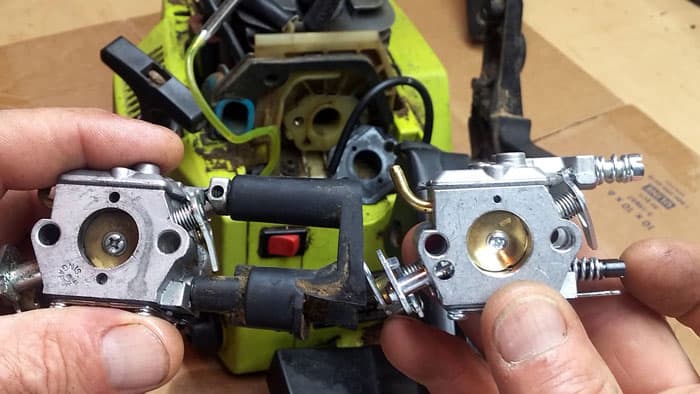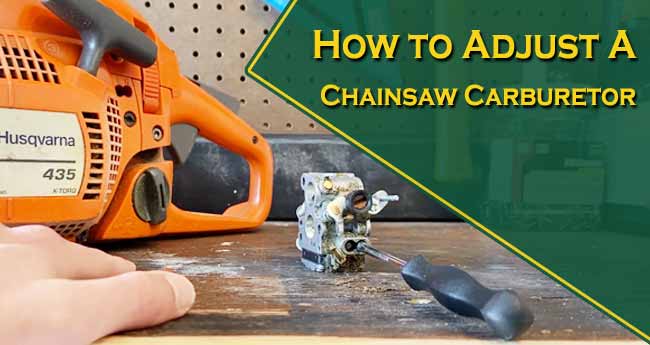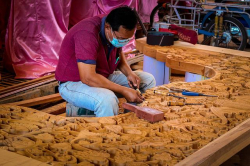A carburetor is an exceptional part of a chainsaw that controls the quantity of fuel used by the machine.
It is crucial to tune this section of the chainsaw properly because otherwise, your tool could malfunction and become difficult to use. A too costly adjustment could damage the engine eventually, which is why you need to be super careful with tuning.
Why Is Carburetor Important?
When it comes to a fuel chainsaw, a carburetor determines how little fuel will mix with air, which helps run the tool.

If too much fuel mixes with air, the engine will eventually get flooded with fuel. And too little fuel will leave chainsaw with less power, which means there will be smoke. As a result, there will be a build-up of carbon, which could damage the engine.
Three Adjusting Screws
Carburetors of most chainsaws come with three adjustments:
Idle Speed
When the throttle trigger is released, this adjustment determines how much the throttle valve will remain open. Too high idle speed will cause saw’s centrifugal clutch to start working, and the chain will start running. On the other hand, too low idle speed will make your engine die as soon as the throttle trigger has been released.

High Speed
This adjustment controls how much air and fuel will mix for cutting speed. A few people might argue that this is probably the most critical adjustment screw out of all three.
If this adjustment is too high, the saw will not reach a required RPM level needed for maximum power. Too low of modification will give you an RPM level where cylinder seizure and bearing failure could occur.
Low Speed
This adjustment determines how much air and fuel will mix during idle speed. Too less of an adjustment will make engine surge due to starvation. And too high of a change will cause the engine load up and eventually die. The engine could also die if the adjustment is extremely low.

How to Adjust a Carburetor?
- Take a look at the air filter and if required, clean it up. If you do not clear up any clogs that remained, you will end up adjusting the saw with a dirty filter. Eventually, when the filter is cleaned, the saw will end up running lean.
- After that, check the fuel level of the saw. Make sure that the tank is more than half full. If you adjust the chainsaw with low fuel, when you fill-up the tank eventually, the carburetor may become too adjusted. Then start the engine and let it warm since a cold engine might give you a rich adjustment.
- Then, you will need to focus on idle speed. Start by setting the speed at 2700 RPM, using a tachometer. Just make sure that the saw does not stay idle, making the chain run as soon as the throttle is released.
- For low-speed adjustment, turn screw inwards until the engine starves and note the position of the screw then. After that turn screw outwards to make the engine run better and then start to load up.
- Note this position of the screw as well. The optimum position of the screw should be somewhere between first and second noted positions, where the machine will idle best.
- For high-speed adjustment, turn screw inwards until the fuel mixture leans out. Then turn it inwards until you hear a flutter. You should now have a correct RPM, which you can check out with a tachometer.
- For further clarification, please check the chainsaw's manufacturer's website for additional instructions.
Tips for the Process
Make sure the machine is lying on a flat surface first. There should be no extra items around the saw, especially near the chain area. You do not want anything to snag on the chainsaw blades by mistake during the adjustment process.
It is a great idea to wear protective hand gear such as leather gloves. Also, have a set of safety goggles on, along with a full-sleeved shirt and long pants too.
Conclusion
Because the carburetor is a key piece to the chainsaw, it is a good idea to know how to adjust it. In this way, you could make sure that your machine has been running appropriately. As a result, your tool will last you a long time.
Some Other Chainsaw Related Articles:
- Best Chainsaw Chain Reviews 2024 – Expert Buying Guide - March 17, 2020
- 7 Best Husqvarna Chainsaw Reviews 2024 – Buying Guide - March 17, 2020
- 10 Best Chainsaw Gloves Review 2024 – Beginners Buying Guide - March 8, 2020


